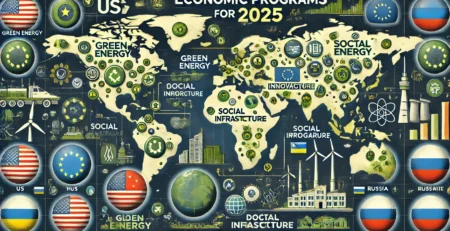What should the priorities of the 2025 budget be?
Strategic considerations
Equality: Ensuring that government spending benefits all segments of society, especially marginalized and disadvantaged groups.
Sustainability: Focusing on long-term goals and the environmental, social and economic sustainability of investments.
Efficiency: Ensuring that funds are used effectively, minimizing waste and maximizing value for money.
Effectively allocating funds from the state budget is a complex task that requires balancing short-term and long-term goals while addressing the needs of citizens. The specific allocation depends on the priorities of the government and the challenges facing the country, but in general, what we think about how it could be divided are these main areas:
1. Education
Primary, secondary and university education.
They should already have met measurable objectives with the systems of advanced European countries, due to a very rich heritage from the past. Ensuring that quality education is accessible and affordable at all levels is still not expected to be met this term of government.
Teacher training and resources.
Investing in teacher quality and classroom resources to improve the education system, an unmet objective.
Vocational training.
Focusing on skills development to prepare citizens for a productive and competitive workforce is still far from the target.
2. Healthcare
Ensuring access to healthcare for all citizens, financing hospitals, clinics and public health programs should be the next top priority.
Investing in the quality of service, equipment and medicines, along with health education and programs to reduce the burden of preventable diseases should be at another level.
Addressing mental health challenges, which often have long-term social and economic impacts, is also not where the objectives are for this situation that is Albanian society.
3. Infrastructure
Transport.
Roads, bridges, railways and public transit systems that should complement each other are still not essential for economic growth and mobility.
Energy
Investment in renewable energy, power grids and other sustainable energy infrastructure to meet future needs is on track but with many challenges that require reform and financial structuring of the sector.
Technological infrastructure
Expanding broadband internet access to remote and underserved areas, one step back and one step forward, without changing with the times and market challenges.
4. Economic Development
Job creation programs. Supporting the growth of industries that will provide long-term employment opportunities, especially agriculture and local producers, has received very little budgetary attention, and this lack is reflected in the low representation in economic growth.
Small and medium-sized enterprises
The provision of loans, grants and incentives for startups and small businesses to promote innovation and entrepreneurship is at minimal levels and fails to create any sustainable incentive for them.
Research and development
Funding innovation in technology, health and education to create a more competitive economy, especially after their failure in the past, has still remained hostage to uncertainty and lack of proper political will.
5. Social Welfare
Poverty Alleviation
Programs to support low-income families, such as unemployment benefits, food assistance and housing support, are less than half of the assistance that should be provided by the budget.
Disability Services
Ensuring that people with disabilities have access to services, education and employment opportunities is also lacking in quantity and quality.
Pension Funds
Ensuring that the aging population has financial security is in a Hamletian dilemma.
6. Public Safety
Police and Law Enforcement
Guaranteeing the safety and security of citizens, with a focus on community policing and crime prevention, has not met the objectives set for this mandate.
Fire Services and Emergency Response
The construction and maintenance of an efficient emergency response system is still not where it needs to be to cope with the growing number of situations.
We only understand the allocation of funds for disaster preparedness, climate change adaptation, and crisis management when they happen, with little funding for their prevention.
7. Environmental Protection
Conservation and Sustainability: The protection of natural resources, forests and wildlife and bio-bio is suffering periodic destruction in the name of profits by a few interest groups
Waste Management
Investment in waste management and policies to reduce pollution emissions are the weakest point of support and focus of the budget.
Water and flora and fauna management. Ensuring access to clean water and efficient flora and fauna management systems do not have the necessary focus.
8. Defense and National Security
Military and defense
Ensuring the country’s defense readiness through investments in military equipment, personnel and national security programs has begun to be in focus since 2024.
Cybersecurity
Protection from digital threats, ensuring infrastructure security and securing personal data have fallen prey to hasty short-term policies with electoral approaches. However, in the last 3 years there has been a special focus from the budget.
9. Debt Repayment and Fiscal Responsibility
Debt Service
Allocation of funds to repay the national debt, ensuring that the government remains financially sustainable is an obligation that is increasing year by year.
Deficit Reduction
Balancing the budget over time by controlling spending and increasing revenues has been a positive approach for several years.
10. Government Operations and Administration
Public Sector Efficiency
Ensuring that the government functions efficiently with transparent budgeting, procurement and reporting processes should not cost more than the value of its performance. The cost of administration has increased in the last two years, failing to justify it with taxpayers’ claims.
E-Government
Investments in digital services for more efficient public administration and citizen engagement are poorly correlated with levels of corruption, low quality of service, and ineffective use of taxpayer time.
11. Foreign Affairs and International Cooperation
Foreign aid and humanitarian aid
The allocation of funds for national development, peacekeeping and humanitarian aid is still poorly represented in everyday life.
Diplomatic relations
Support for embassies and consulates, international negotiations and cooperation on global issues, especially economic diplomacy, is still part of a weak performance.
The exact distribution of funds depends on the specific needs of the country, the economic context, political priorities and other factors. Ideally, the government should conduct needs assessments, engage stakeholders and use evidence-based budgeting techniques to distribute funds efficiently.




Leave a Reply
You must be logged in to post a comment.